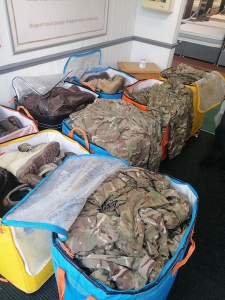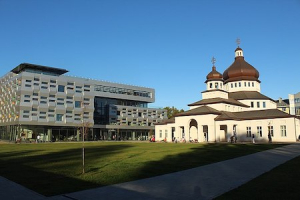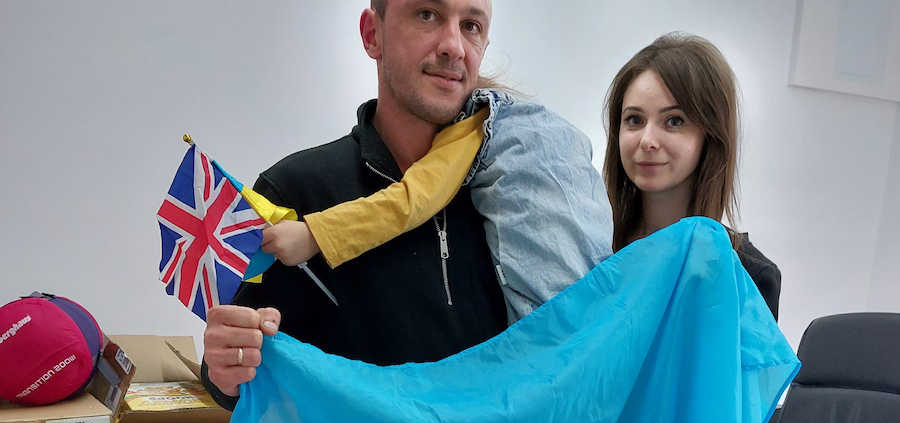“Our Souls Are Destroyed but We Still Pray and Hope”: A Report on Relief Efforts for Ukraine by Michael Ford
WELCOME TO HELL, RUSSIANS screamed the front-page of The Times, which also showed a harrowing picture of a house ablaze after being destroyed by shelling.
It was the 10th day of the invasion of Ukraine. Like many others around the world, I had been monitoring developments closely and becoming increasingly horrified. I also noticed that, day after day, BBC television journalists presented their latest reports beside the magnificent, golden-domed Saint Sophia Cathedral in Kyiv, a UNESCO world heritage site.
How strange, I kept thinking, that beauty and terror can coexist at times like these.
Then, far away from events in Eastern Europe, I happened to discover that, close to my home in peaceful rural England, a Ukrainian family was in the news. Vitaliy and Mariana Dolynskyy, who are Orthodox Christians from western Ukraine, made the only front-page headline in the local paper: “We Can Still Do Something.”
When I went to meet them, only a few miles away from where I live, it was clear they did not want to be regarded as celebrities or publicity seekers. Over coffee in their home, they explained that, with the backing of the Ukrainian embassy in London, they had been helping send military and medical aid back to their beleaguered country. Thanks to generous donations, four ambulances had been purchased in the UK and had just arrived in Ukraine. Before leaving, they had been packed with essential medications, bandages, first aid equipment, and anti-bleeding pads.
“It was just a natural, instinctual response without even thinking,” said Mariana, expressing her public gratitude to all who had worked “really, really hard” in recent days. Volunteers had come from all walks of life and had given selfless service for others, as they had in Ukraine. “As for us, we can’t go home but we can do something from here in England.”
During our conversation, phones bleeped constantly as messages and videos were received from family members, friends, and volunteers who were risking their lives. “I speak to Ukrainian people every day and they text me messages,” said Vitaliy, who is from Ivano-Frankivsk near Lviv. “There are thousands of Russians out there but just hundreds of our guys fighting with them. They are very brave.
“I know of people in their private cars are taking food to Kyiv and Lviv. They do this every day. I get requests for help. On my Facebook page, for example, I might find someone wanting a larger minivan, so I pass this on to my contacts there.”
Vitaliy, who works in the IT trading business, recently spent three months in Kharkiv in the east of Ukraine. As in other embattled cities and towns, Russian missiles, shells, and rockets have obliterated people’s homes and familiar public buildings, killing and maiming women, men, and children indiscriminately. Vitaliy is still seeking helmets, bulletproof jackets, body armor, uniforms, and shoes as well as first aid kits. “We need these for the residents,” he said. “They have been given machine guns for territorial defence and we need to support them.”

Supplies collected for Ukraine
The Ukrainian is in touch here with a former British commando, Ben Forbes, who has been making the most of his contacts among veterans and serving soldiers to generate a flow of donated combat equipment in support of the Ukrainian defense forces. He has collected full sets of military-grade combat armor, chest rigs, plate carriers, ballistic helmets, uniforms, boots, and battlefield trauma kits, as well as guerrilla warfare and commando tactics’ doctrine. Once approved by the embassy, it’s all transported to the Ukrainian front lines.
Vitaliy, who has met President Volodymyr Zelenksy, points out that the former actor and stand-up comedian is the right man to the lead the country at this time. Best known for playing a fictional president in a television series, he has now become a real-life hero in everybody’s eyes. And he does not appear scared, Vitaliy says. President Zelensky has not left the country and is making the right decisions. He recently became the first head of state to address the House of Commons in London (via video link).
Zelenksy, 44, was born to Jewish parents, the son of a professor and an engineer, and studied law. Many of his fellow students have been on the barricades. One said that at university Zelensky was already showing leadership qualities; he was energetic and skillful at organization. The former student and volunteer added that, while he had been dubious at first about Zelensky entering politics, since the invasion he has inspired every person in Kyiv and is now seen by many as the best president Ukraine has ever had. Loyalty to him runs deep.
“He’s real action—thoughtful and caring for his country,” enthuses Vitaliy. “I don’t think someone else would be as brave as he is.”
As her husband shows me the latest distressing pictures from Ukraine on his phone, Mariana keeps an eye on their four-year-old daughter, Adele, sitting quietly in the room. Mariana, who is from Lviv and works in the west of England as a doctor, tells me: “I am afraid to wake up and read the news. It’s really scary. What if we lost the internet or the phone connection? I’m calling my family a hundred times a day to check on them. I felt so destroyed at first. But my family and friends think I am more frightened than they are as we are so far away.”
Mariana’s parents came to Britain in February but insist they would not want to come back here now. Though she is young, Adele shows concern for her grandmother and grandfather. When she asks via a video call where her grandma is, Adele requests to be shown the window so she can be assured that Putin is nowhere in sight.
“My parents, who are also doctors, have taken in 10 people who are sleeping on the floor,” said Mariana. “They’re sheltering them, cooking for them, and giving them clothes. I would like to be there to hug my Mum and Dad but I can’t. My parents didn’t tell me at the beginning because they didn’t want to worry me. My mum is cooking food for all the people in her house and I realize how tired she is. But she says: ‘We have to do something.’
“My father has only just got over the Omicron virus but Covid seems to have vanished from the country as people put their minds and hearts towards resisting the Russians. My father told me that he was not going to leave his house or his land. As a doctor, he could be more useful in Ukraine than Britain: ‘We have been living here all our lives,’ he said. ‘Why would I give up?’”
Mariana says she fears there will be a sanitary disaster with people spending multiple days at a time in lines away from home. But, more positively, everyone is so connected now, she explains. More and more people are opening up their homes, feeding refugees, and supporting them as best as they can. “My friends feel a little depressed now, overwhelmed and tired, and some of them are angry. But, on the other hand, they will never give up.”
Vitaliy and Mariana told me how, before the invasion, Ukraine had been such a peaceful country with beautiful towns and cities, always united as it is now. It had to be defended at all costs. Ukrainians would not yield to the Russians and would fight to the death.
A survey last year by the Kyiv International Institute of Sociology found that 82 percent of Ukrainians declared themselves to be “religious.” Ukraine has the world’s second-largest Eastern Orthodox population after Russia. The majority are members of the Orthodox Church of Ukraine, while a smaller number belong to the Ukrainian Orthodox Church of the Moscow Patriarchate. There are also Greek and Latin rite Catholics, Protestants, Jews, Muslims, and Hindus. All faith traditions have united in Ukraine to pray for peace. Mariana told me that there was evidence of the Russian Church in Ukraine supporting Russia as military equipment had been discovered in some villages.
Although Vitaliy and Mariana are Orthodox, in this corner of England they go to an Anglican church in a nearby village where Adele attends the local primary school. “We believe in the one church,” said Marianna. “I think prayer provides us with hope and we hope from God that he will save us. But our souls are destroyed. We’ve been praying for everyone, all our friends, everyone we know. Prayer is powerful and can also relieve us of our anxieties a little.”
Henri Nouwen and Ukraine
I told the couple about the influential Catholic theologian and author Father Henri J. M. Nouwen, who visited Ukraine twice in the 1990s. In 1994 Nouwen wrote somewhat prophetically:
With so many voices in Russia wanting to reclaim Ukraine as part of their territory, there is constant fear that independence might be a very fragile thing. The fact that the U.S. pays so much attention to Russia and so little to Ukraine, except in pressuring it to give up its nuclear arsenal, makes Ukrainians question how much international support their independence will get when push comes to shove.

Ukrainian Catholic University, Lviv
Nouwen went to Russia to research his most popular book, The Return of the Prodigal Son, and died in Holland on his way to make the film version there in 1996. But it was Ukraine that remained close to his heart. His visits in 1993 and 1994 are said to have had a significant impact on the development of the Faith and Light organization and the L’Arche communities as well as other lay initiatives in the country. As a one-time friend of Metropolitan Borys Gudziak (now Archeparch of the Ukrainian Catholic Archeparchy of Philadelphia), Nouwen is said to have influenced the founding of the Ukrainian Catholic University in Lviv, where Metropolitan Gudziak served as rector and president. It was always known as the first Catholic university to open on territory of the former Soviet Union.
Outside a small wooden chapel in the suburbs of Lviv on his first evening there, Nouwen heard the singing of a chant, Hospody pomyluy, Russian words meaning “Lord have mercy.” As he listened, he felt reassured and connected. For Orthodox Christians, these words form the heart of the Jesus Prayer that lies at the core of Eastern spirituality. Many in Ukraine are uttering this prayer at this time.
Nouwen journaled that “Lord have mercy” was the prayer of God’s people, one that had resounded through the centuries of struggle, wars, persecution, and oppression. While they were words of the liturgy, they also belonged to the intimate prayer of the heart. During his pilgrimage to Ukraine, visiting children with learning disabilities, it gradually dawned on him that his love of prayer, liturgical life, and sacred art had been strongly nurtured by the Christian East. In his journals, using the language of the time, he wrote:
Although we live and work with people with mental handicaps, we certainly do not live a poor life. Our trips to Ukraine show us another type of handicap. It is the handicap that comes from a broken history, from centuries of oppression and exploitation, from neglect and indifference of the wealthy nations, from the social sins of injustice and greed. Not only people with mental handicaps are marginalized in our world, but countries as well. Ukraine is one of the marginalized countries among the international community of nations. Men and women with mental handicaps in Ukraine are the marginalized people in a marginalized country.
A copy of Nouwen’s Ukrainian Diaries was presented to President Zelensky and the First Lady during a visit to New York this past September. Metropolitan Gudziak told them that the book contained deep and touching reflections on Ukraine and Ukrainians. Although Vitaliy and Mariana said they were not familiar with Henri Nouwen’s work, they were pleased to learn he had written about their country so compassionately.
“We will fight to the end”
“At the moment we’re very frustrated, sad, and heartbroken,” said Mariana. “I can’t even tell you how I feel every single day. It’s a big tragedy for our nation. But in another sense our mood and our spirit are really raised nowadays. I had never thought before how united we can be and how encouraged we can be. We are supporting each other in different ways to defeat Putin.
“It’s become a phenomenon really. It doesn’t matter what you do or who you are, everyone tries to help and support each other. We are sending our family and friends pictures of us and simultaneously they feel support from here.
“Maybe sanctions will mean people will turn against Putin,” she continued. “I think his colleagues are scared of him. But there is no such thing in Ukraine as fear, except for the lives of the people Ukrainians love, those who are taking such risks at this time. I don’t think people there are scared any more. We are protecting what belongs to us and there is not even a word of fear.
“We are fighters and we are a big nation. And our women as well are so brave. Can you imagine people staying underground in a cold place without food? This is now their home. They are protecting each other.”
Mariana concluded on an emotional note: “There have been threats against us for so many years. But we never thought it would go so far. We have been contacted by politicians. Some of them say this will last for months, others longer. I do not know how the Russians can stop. But we will fight to the end. We will never ever give up.” ♦
Michael Ford is a biographical writer and ecumenical theologian living in the UK. His features for TAC reflect a lifelong interest in the spiritual and psychological journeys of women and men from all walks of life. He may be contacted at hermitagewithin@gmail.com. To assist the Dolynskyys and related aid efforts to Ukraine, visit ukrainesupportaid.org.





Leave a Reply
Want to join the discussion?Feel free to contribute!